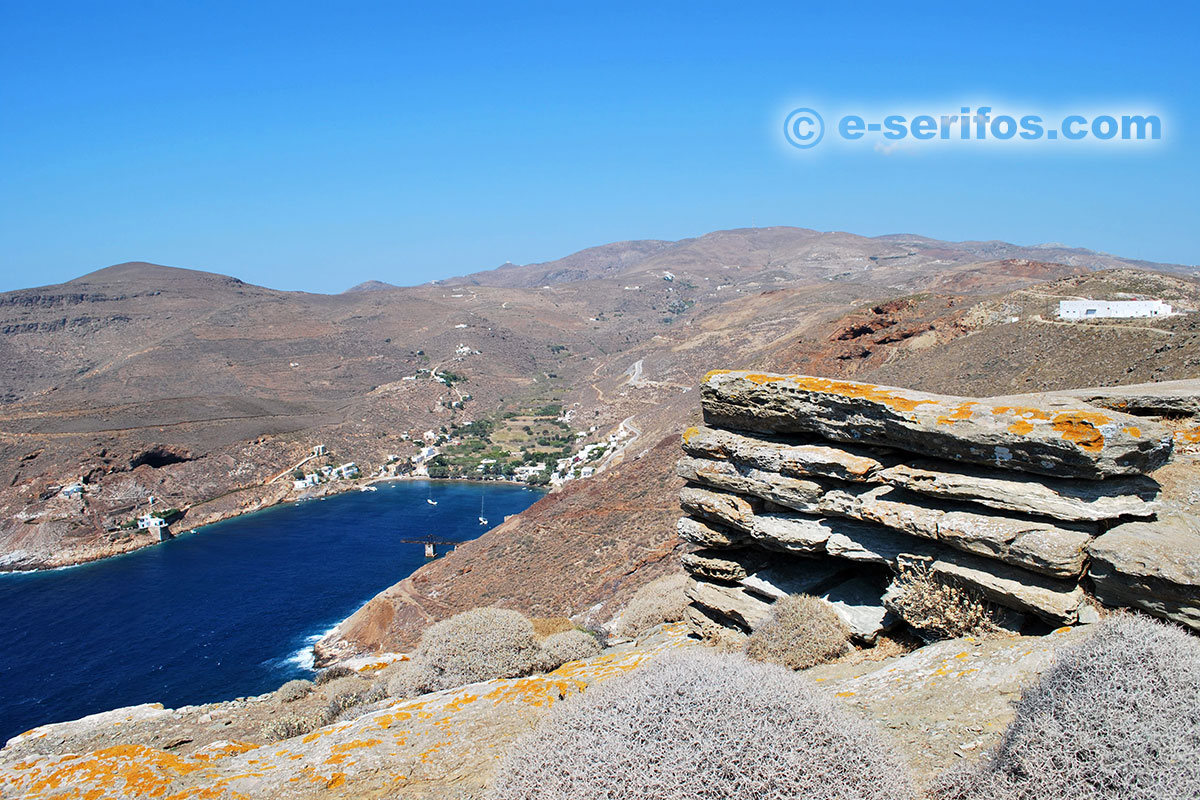Mythology of Serifos
The myth of Perseus and Danae
The myth of Medusa and Perseus
The Cyclopes
Serifos occupies an important part of Greek mythology, since its name is connected to two of the greatest heroes of the mythology, Odysseus and Perseus, while it is also said that the Cyclopes lived in its caves.
Nowadays, it is said that the Cyclopes lived in the Cave of the Cyclops, while the remains of the cyclopean walls are also attributed to them.

The myth of Perseus
The most important legend making reference to Serifos is that relating the island with Perseus. According to the legend, Acrisius, the king of Argos, went to the oracle at Delphi wanting to know whether he would have a child and the oracle warned him that he would die by the hand of his grandson, born by his daughter Danae, who would succeed him to the throne.
To protect himself, Acrisius locked Danae away in a cellar. However, he did not take into account the sudden love of Zeus, who came in through the roof as golden shower and gave her a son, Perseus.
Acrisius terrified that the oracle will come true but unwilling to kill his daughter and her divine son, shut Danae and Perseus in a wooden chest and let them in the Aegean Sea.
The chest cast out in the coast of Serifos, where the fishermen found it and took it to Dictys, one of the two kings of Serifos, in whose palace Perseus grew up.
Meanwhile, the second king of Serifos, the cunning Polydectes, fell in love with Danae and wanting to get rid of Perseus he sent him to bring him the head of the gorgon Medusa as a wedding present for his supposed wedding to Hippodameia, daughter of Oinomaos. It was known that the terrible Medusa turned people into stone with her gaze.
The Perseus' journey
Thus began Perseus’ long journey. At first accompanied by Athena and Hermes, who offered him two precious weapons to help him -Athena gave him a bronze shield and Hermes a sword- he arrived to his first destination, to the home of the three Graeae, Enyo, Pephredo and Deino, in the land of Forkynos and Cetus.
The three sisters looked old, shared one tooth and were the only ones that knew were their sisters, the Gorgons, lived. To take the information he wanted, Perseus watched them hidden and the moment they were passing their eye and tooth between themselves he snatched them and threatened them that he wouldn’t return them unless they told him where their sisters’ laird was. The three Graeae naturally accepted to lead Perseus to the Gorgone island, where the Gorgons, Medusa and her sisters, Stheno and Euryale, lived.
According to the legend, before Perseus went to Gorgone, he passed through the garden of the Nymphs and they offered him three precious tools: the crest of Pluto, the God of the Underworld, which made him invisible, a pair of winged sandals that would enable him to fly and a bag that changed size depending on its contents.
Thus, flying above the ocean he arrived to Gorgone, where he beheaded Medusa using the shield to see only her reflection thus avoiding her gaze that would turn him into stone, and then put her head in his bag. It is said that Pegasus, the winged horse of the mythology, was born by the drops of blood that were shed on the ground.
The return of Perseus
In his way back, Perseus faced numerous dangers. Passing by Ethiopia, he found Andromeda, the daughter of king Cepheus, tied to a rock to be eaten by a monster to appease Poseidon so that he would forgive Cepheus wife, Cassiopeia, who had insulted the god's daughters. Perseus killed the monster and rescued Andromeda, he married her and took her with him to Serifos.
There, he showed the head to Polydectes, who turned into stone when he looked at it and Dictys was made king of the island. According to the legend, he then took his wife, Andromeda, and his mother, Danae, and returned to Argos, where, on the day of their arrival, the games were held in the presence of king Acrisius.
Perseus participated in the games giving a fake identity and threw the discus that deviated from its course and killed Acrisius by hitting him. Thus, the Delphic utterance came true and Perseus settled there as king of Argos. An equally great hero of the Greek mythology, Hercules, was born by his grandson, Amphitryon, and Alcmene.
Finally, Odysseus is said to have passed by Serifos on his return journey to Ithaca, where he faced the Cyclops Polyphemus, whom he blinded with his spear to allow him and his men to escape from him.